Featured Student: Wendy Hwang
April 8, 2024
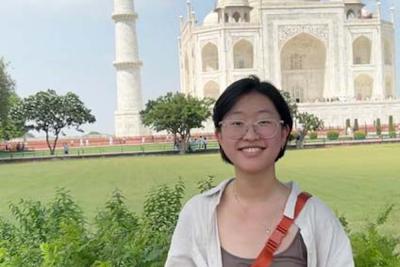
April 8, 2024

I'm in my fourth year studying Biology with a Microbiology minor. I plan to graduate in May 2025.
I signed up for the co-op program to better understand what I wanted to do career-wise and to gain practical experience along the way.
I also wanted to apply my classroom knowledge to hands-on wet lab experiences. Before co-op, I didn’t know what current and ongoing research involved and I'm grateful for the chance to have tackled real projects with the support of an amazing lab.
I've been working as a research assistant at the Luo Lab, at the Centre for Heart Lung Innovation, for almost a year now. I’m learning a lot every day. The environment is incredibly stimulating and offers endless opportunities to expand my knowledge and skills.
Working as a research assistant at the Luo Lab, I've been involved in a project that examines myocarditis, specifically the inflammation caused by Coxsackievirus B3 (CVB3).
This non-enveloped, single-stranded RNA virus - which spreads through the fecal-oral route - is known to induce cellular dysfunctions, such as impaired autophagy, mitochondrial damage and autoimmune responses.
My focus has been on exploring how CVB3 leads to the downregulation of complement system regulators, a critical aspect of our immune defense. Our approach to uncovering this mechanism is hypothesis-driven research. We employ a variety of techniques, including cell culture, the construction of custom plasmids, Western blots and qPCR, among others.
An integral part of our process involves extensive literature review. This not only helps in identifying potential mechanisms based on the strategies other viruses might use but also helps determine the optimal protocols for our experiments.
In our work, troubleshooting is important. The nature of scientific research is that experiments often don't show the results that we hoped for. When these challenges arise, they mean further reading and experimentation, in a cycle that, while demanding, is incredibly exciting. Each experiment teaches me something new; it’s a steep, but rewarding, learning curve.
Throughout this journey, I've been fortunate to receive great mentorship from Drs. Honglin Luo and Yasir Mohamud. Their guidance has been critical in my development, enhancing not only my technical skills but also my ability to think critically and adaptively. This experience has been very educational, shaping my understanding of viral pathogenesis and the complexities of immune regulation.
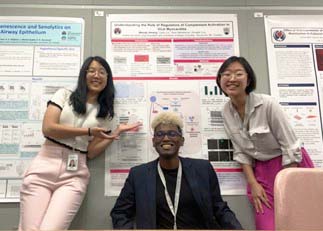
BIOL341 was incredibly relevant to my current role; it's an introductory course in molecular biology lab techniques, covering western blots, cloning, qPCR and gel electrophoresis.
These are techniques that I use daily in the lab. Having both theoretical background and practical experience from this course has been hugely beneficial.
Additionally, the concepts that I learned in MICB306 (Molecular Virology) and MICB308 (Bacterial Pathogenesis) have been valuable. They've not only helped in understanding the papers I read but also in formulating hypotheses for my research. These courses equipped me with a practical and theoretical foundation that I apply at the lab every day, connecting classroom learning and real-world research.
One of my favorite experiences during co-op was attending the annual end-of-year event organized by the centre at a nearby bowling alley. It was such a nice break from the usual lab routine. We bowled, played pool, drew names for prizes, had food and it was overall a fun and relaxing time. Interacting outside of work allowed us to get to know each other better and form lasting bonds within the lab. The sense of friendliness and support among lab members was evident throughout my whole co-op experience.
It was nice to see how everyone from different departments and backgrounds came together to celebrate and enjoy. The genuine kindness and willingness to help one another really shows the sense of community within the centre. This experience left a lasting impression on me and made me want to come back in the future. It's moments like these that make the co-op experience not only professionally, but also personally fulfilling.
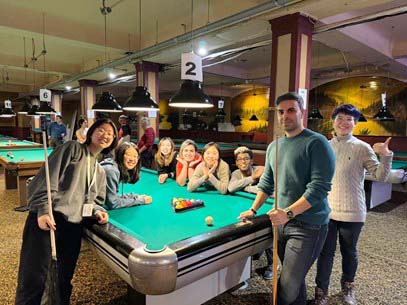
My best achievement is the People’s Choice Award from the annual summer research day here at the centre. We submit our abstracts and get assigned to posters, oral presentations or knowledge translation (KT) talks.
KT is a one-minute presentation with one slide to efficiently translate my project in simple terms. The poster and KT presentation were assigned and together with my colleagues, we came up with a creative way to communicate my project through a metaphorical story. It was selected for the People’s Choice Award and I am very thankful for the support and encouragement of my colleagues’.
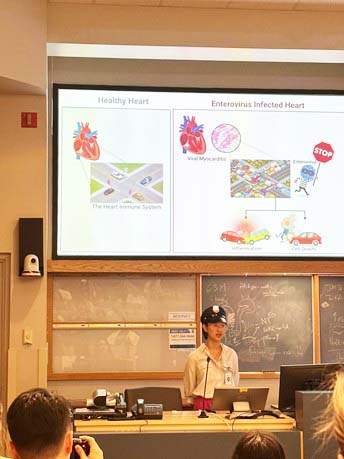
Troubleshooting is the hardest part of research for me - and arguably the most fun, as well.
There are moments when it feels like nothing is going according to plan, but you learn something through it. Tracing back my steps and adjusting procedures to troubleshoot unexpected results can be both daunting and exciting. The possibility of uncovering new insights keeps me motivated and I've come to view troubleshooting as an integral part of the research process: a puzzle to be solved.
To overcome unexpected or undesirable results, taking time away is important. Continuously retrying experiments, even with troubleshooting, can cloud judgment and lead to frustration. Instead, taking a break, focusing on other experiments and returning with a fresh perspective has been more effective.
Participating in the co-op program enhanced my social skills. Through different networking events, meeting new people and presenting my work, I've expanded my social circle and met so many people from diverse backgrounds.
Being surrounded by inspiring and supportive colleagues on a daily basis definitely played a role in my personal development. Their encouragement and friendliness have helped me become more open as a person.
I’ve also learned that everyone's scientific opinion is respected at the center, regardless of their level of education or expertise. This inclusive environment helped me to express myself confidently and share my ideas without fear of judgment. Through my co-op experience, I've discovered more about myself and have grown to enjoy challenges. I've learned not to shy away from expressing my thoughts and opinions. I'm grateful to the supportive community for my personal and professional growth.
Co-op opened my eyes to the world of research. Before this experience, I wasn't sure what research entailed. Having explored wet lab research, I've found what I enjoy and am considering graduate school. Co-op made me aware of possibilities I wouldn't have known otherwise.
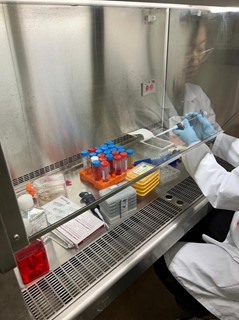
Don’t be afraid to try it out! The thought of working in a real laboratory with new people and all the knowledge required intimidated me, but you’ll never know what you’re capable of until you try it; it was the best decision I’ve ever made.
Working alongside others in the lab turned out to be incredibly rewarding and enjoyable. I’ve found that there's always room for growth and learning. Embrace the process of reading research papers; they're the go-to source for knowledge.
Once you start working on a research project and present your work, you’ll be amazed at what you’ve accomplished. Your project-specific protein names and pathways will never leave your brain. It's okay to feel overwhelmed initially, but trust in your ability to adapt and learn. Remember to never compare yourself to others. Your journey is unique and your progress is something to be proud of!
I’m looking forward to graduate school! I wasn’t entirely sure of my post-graduation plans, so I never looked forward to graduation, but Science Co-op made me more confident in my future path and sparked an interest in research. I’m excited to continue research through graduate school and expand my knowledge and skills.
While I’m not sure what’s beyond graduate school just yet, I'm optimistic that the experiences and opportunities during this time will help shape my direction. For now, I'm focused on the journey ahead.
We honour xwməθkwəy̓ əm (Musqueam) on whose ancestral, unceded territory UBC Vancouver is situated. UBC Science is committed to building meaningful relationships with Indigenous peoples so we can advance Reconciliation and ensure traditional ways of knowing enrich our teaching and research.
Learn more: Musqueam First Nation